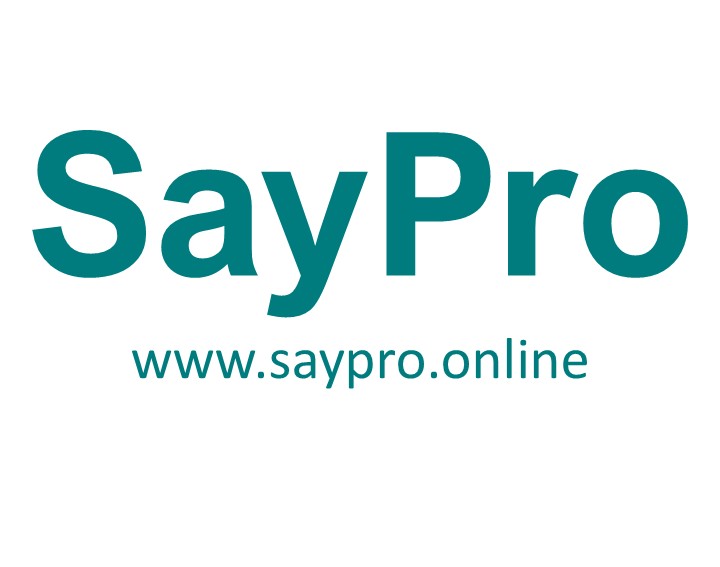SayPro Monthly March SCMR-5 SayPro Monthly Classified User Communication: Enable direct messaging between users and admins by SayPro Classified Office under SayPro Marketing Royalty
1. Provide Guidelines on How to Handle Different Types of User Inquiries Professionally (March 16 – 17)
Objective: Equip the admin team with the skills to handle user inquiries effectively, maintaining professionalism and ensuring satisfaction.
Tasks:
- Understanding Common User Inquiries:
- Review common categories of inquiries users might have (e.g., account issues, payment queries, content moderation, ad placement).
- Create a list of frequently asked questions (FAQs) to guide the admin team.
- Response Templates:
- Develop and provide a set of response templates for the most common types of inquiries (e.g., password reset, ad approval status, payment confirmation).
- Ensure templates are polite, clear, and concise, offering users all necessary details without confusion.
- Tone of Voice Training:
- Emphasize the importance of a professional yet friendly tone when communicating with users. Admins should be polite, empathetic, and solution-oriented.
- Conduct role-play exercises where admins practice answering different inquiries in both email and chat formats.
- Escalation Procedures:
- Outline scenarios in which a user inquiry should be escalated to higher-level management or a specific department (e.g., fraud or billing disputes).
- Develop a flowchart of escalation steps for easy reference.
- Managing Difficult Inquiries:
- Provide guidance on how to handle difficult or irate users, ensuring admins can de-escalate situations without losing professionalism.
- Teach strategies like active listening, showing empathy, and offering solutions that align with company policy.
2. SayPro Monthly March SCMR-5 SayPro Monthly Classified User Communication: Enable Direct Messaging Between Users and Admins by SayPro Classified Office under SayPro Marketing Royalty (March 18 – 19)
Objective: Enable a seamless communication channel between users and admins for enhanced service delivery and user experience.
Tasks:
- Introduction to Direct Messaging System:
- Train admins on the new direct messaging feature within SayPro Classified, allowing users to communicate directly with admins.
- Provide an overview of how direct messaging integrates with the SayPro platform’s backend and user interface.
- Admin Responsibilities in User Communication:
- Define the role of admins in managing direct messages from users, ensuring they respond in a timely manner.
- Set response time expectations (e.g., all user inquiries must be acknowledged within 24 hours).
- Effective Use of Direct Messaging:
- Provide instructions on how to use the messaging platform effectively (e.g., sending messages, marking them as resolved, or escalating to another department if needed).
- Encourage admins to maintain an organized message inbox, categorizing inquiries for easier tracking.
- SayPro Marketing Royalty Integration:
- Explain the connection between the direct messaging system and SayPro Marketing Royalty initiatives. Show how user communication can be leveraged for marketing purposes (e.g., upselling services or addressing concerns that may hinder user satisfaction).
- Discuss the types of user communication that could be used in promotional campaigns or loyalty programs (with user consent).
- Security and Privacy Guidelines:
- Emphasize the importance of protecting user information. Admins should handle all direct messaging interactions with discretion and ensure that sensitive data is never shared improperly.
- Provide a reminder of the platform’s privacy policies and user rights when engaging in direct messaging.
- Practical Application & Mock Sessions:
- Conduct mock direct messaging sessions where admins simulate communication with users, focusing on addressing inquiries, following escalation procedures, and keeping the conversation professional.
- Evaluate the responses and provide feedback to ensure consistency and quality in communication.
- Tracking and Reporting Communication:
- Teach admins how to log, track, and report on user communication effectively. This could include tracking unresolved issues, measuring response times, and generating reports on user satisfaction.
- Explain the importance of reporting metrics for future improvements in user communication and marketing strategies.
3. Onboarding Evaluation and Feedback (March 20)
Objective: Assess the admin team’s understanding and application of the training, ensuring readiness for live user interactions.
Tasks:
- Knowledge Check:
- Admins will complete a quiz or practical test covering all the key concepts from the training sessions (e.g., handling inquiries, using the direct messaging system).
- Include scenario-based questions to assess their ability to make decisions in real-time user communication.
- Feedback Session:
- Allow admins to provide feedback on the training process. This helps identify areas for improvement and ensures that all concerns have been addressed.
- Provide a forum for admins to ask additional questions about the direct messaging system or handling user inquiries.
- Certification of Completion:
- Upon successful completion of the tasks and evaluations, admins will be awarded a certificate indicating their readiness to handle user inquiries and manage the direct messaging system.
By the end of this training period, SayPro admins should be confident in professionally handling various types of user inquiries and be fully equipped to utilize the new direct messaging system to communicate with users.

